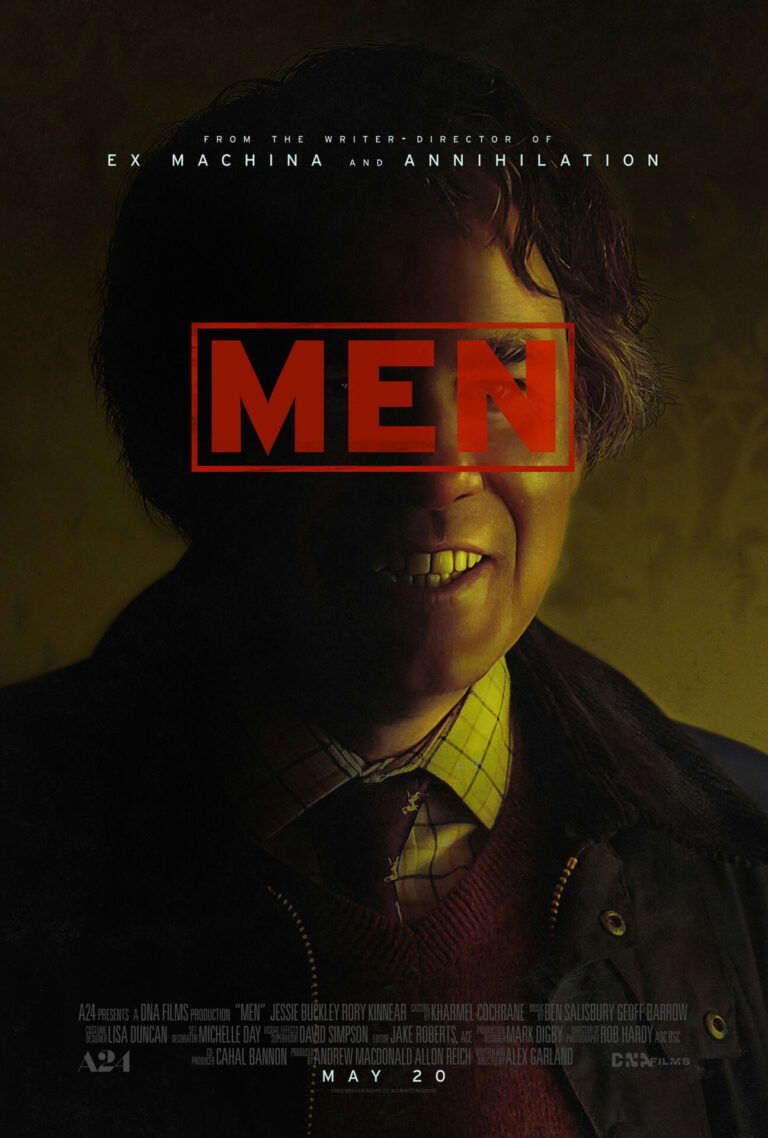“Bizarre, Abhorrent Independent Horror”

| None | Light | Moderate | Heavy | |
|---|---|---|---|---|
| Language | ||||
| Violence | ||||
| Sex | ||||
| Nudity |
What You Need To Know:
The cinematography, score and tension in MEN start out strong. However, they are eventually obliterated by a dive into truly dark depravity, which the movie substitutes for subtle horror. MEN has lots of strong foul language, excessive nudity, and many bloody and violent images. It has a strong, slightly mixed pagan worldview with some Anti-Christian, feminist content. At the very end of MEN, the writer/director tacks on some positive messages extolling love and truth. However, they don’t make up for the bizarre, excessive, disturbing, gory, and lewd images and situations that precede them.
Content:
Very strong, slightly mixed, pagan worldview about male and female relationships that sometimes has a politically correct feminist view attacking men but toward the end suggests that the only thing that all men really want is to be loved, with a very negative Anti-Christian view of a clergyman who later tries to rape the woman who was consulting with him, mixed with some images of two pagan male and female images (the male image actually becomes a “Nature” character in the movie and mixed with undeveloped Christian, moral sentiments in a song at the end saying, “Love is the opening door,” “Love is the key we must turn,” and “Truth is the flame we must burn,” and indicating that love is the ultimate purpose of life
At least 35 obscenities (including nearly 30 “f” words), but no profanities, plus a few scatological vulgarities
Very strong violence with many bloody images includes a man who commits suicide by throwing himself from a building is later seen dead with his body mangled and missing one foot and with his left hand impaled on an iron fence post and with blood all over his head and arms and chest, man hits a woman in the face and knocking her down, a fully naked and self-mutilating man is shown in several scenes with bloody lacerations and mud and leaves all over his body, a woman stabs a man’s hand with a chop knife through a letter slot in a door, and the man extricates it by pulling his hand back through the knife and severing his limb, man is later seen with much blood on his shirt and arm as he brandishes his split left arm, attempted rape, but woman manages to stab her attacker to death, a character is hit by a car and tries to do the same to their attacker, woman stabs a man to death, and there are bloody images of adult male characters “birthing” other adult male characters
Attempted rape, graphic descriptions of sexual fantasies, a sacred image is used as a phallic symbol, and close up of an adult male spawning out of a vagina
A fully nude male figure (ever so slightly blurred by window panes) with bloody cuts on his face watches and stalks a woman inside a house, the same figure is shown repeatedly in other scenes with full frontal male nudity, and gory images of fully nude adult male characters “spawning” other fully nude adult male characters out of a woman’s private parts that suddenly appear on the men’s bodies
Social drinking at a pub
No smoking or drugs; and,
Police release a man known to be dangerous from jail.
More Detail:
Harper Marlow seeks to escape the apparent suicide of her husband after an argument. She leaves London for a two-week vacation in the English countryside. There, in a small village, Harper encounters several men, all of them played by one actor, who clearly have evil intentions toward her. In the movie’s second half, she’s attacked by the male characters, but manages to kill one man who wants to rape her. Eventually, Harper’s story leads to a bizarre, gory ending with apparent allegorical meanings.
The cinematography in MEN of the verdant British countryside is beautiful and breathtaking. The movie’s somber, unsettling tone and horrific elements create a powerful contrast. The score, a series of sacred and classical pieces artfully distorted to evoke uneasiness, adds to the tension. There’s no denying that MEN succeeds brilliantly in being deeply disturbing. Effective camera work makes each scene potentially harrowing due to the off and on appearance of male figures seen by the audience long before they are seen the protagonist. However, the movie fails when it unleashes bizarre, gory images on viewers. As a result, the movie loses any scrap of subtlety or artistic value.
MEN has a very strong, slightly mixed pagan worldview where evil is everywhere and good, if it appears at all, arrives very distorted. The movie manages to raise an important question about marriage for its viewers to ponder. Harper’s marriage with her husband has been torn apart by sin. The nature of their marriage is that neither she nor her late husband have a biblical view of marriage. For example, Harper sees no way out of her marriage to a man who seems to blame her for everything that’s gone wrong with their marriage when she says, “I can’t live like this.” Meanwhile, James, her emotionally and sometimes physically abusive husband, tries to pressure her into staying with him, saying, “I’ll kill myself. . . . [and] you’ll have to live with it on your conscience.” Both wife and husband make it clear they have no Christian worldview from which to approach their marriage problems, whether from the failure of their parents to model and teach them what wedding vows mean, a lack of biblical counseling, their own sinfulness and stubbornness, or all of the above.
Also, the advice Harper gets from the vicar in the village is reflective of a deeply confused, corrupted clergy. One can’t help but think that this portrayal of religious leaders in MEN (and, by extension, Christianity as a whole) is very intentional. The movie’s sordid elements seem to reflect the writer/director’s anti-biblical sentiments. There is no understanding of the role of God in this universe unless it is as a sadistic demon who enjoys watching humans suffer. It reminds one of Baudelaire’s statement: “If there is a God, he is the devil.”
Harper (whose last name, Marlow, appears to be a reference to the narrator of Joseph Conrad’s short novel, HEART OF DARKNESS) has no hope of escaping her grief and horror because, even in a beautiful country church, the imagery is pointedly twisted by her psychological state and by references to pagan folklore. For example, one of the images adorning the church is of a pagan mythological figure called “The Green Man,” which is the face of a man encrusted with leaves and branches. Later in the movie, a totally nude man in the story appears with a face just like the one adorning the church. It’s at this point that the movie goes off the deep end and piles one bizarre, and gory, image on top of another such image.
At the end, the movie tacks on some undeveloped Christian, moral sentiments. It suggests that the thing that all the men in the movie, including Harper’s late husband, really want is just to be loved. This sentiment is reinforced by some song lyrics suggesting that love is the ultimate purpose of life. The song lyrics also say things like, “Love is the opening door,” “Love is the key we must turn,” and “Truth is the flame we must burn.” These sentiments are positive, but they don’t make up for the bizarre, excessive and disturbing images and situations that precede them.
MEN also contains many strong obscenities and images of full male nudity in addition to many bloody images.


 - Content:
- Content: 

